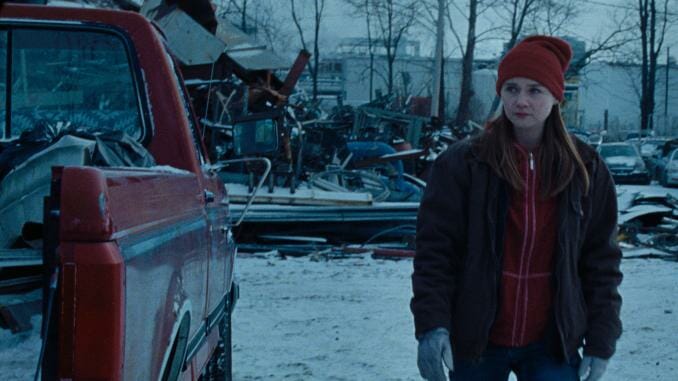Holler‘s Tenacious Coming-of-Age Story Is a Little Rough Around the Edges

The brutalist landscape of an industrial Ohio town dominates the screen in writer/director Nicole Riegel’s feature debut Holler. While this visual language accurately reflects the claustrophobic feeling of living in a bleak town and attempting to navigate its numerous dead ends, it often restricts the viewer from obtaining a deeper insight into the film’s characters and their multifaceted relationships to this place.
Ruth (Jessica Barden) is a high school senior with a stiffly static essence surrounding her, a trait that separates her from other coming-of-age protagonists with inflated fantasies of what the future might hold. Her apparent stagnation is unsettled when it’s revealed that she has been accepted into college after her older brother Blaze (Gus Halper) submits her completed application after Ruth gets cold feet. For what appears to be the first time in her entire life, Ruth is presented with a decision where she has the option to forge her own path, but the incessant guilt surrounding the prospect of leaving her perpetually relapsing mother Rhonda (Pamela Adlon) entirely in her brother’s care keeps Ruth from making a decision outright. The fact that her family’s house is constantly plastered with eviction notices and that funds to pay basic utilities have been nonexistent for months doesn’t make Ruth’s decision any easier. In the interim, Ruth and Blaze find employment at a scrap metal yard run by the rugged Hark (Austin Amelio) while also joining his illegal nighttime effort in pilfering valuable metals from the local factories that can’t seem to stay open.
Barden’s Ruth is certainly convincingly scrappy and jaded, but her hardened-for-her-years appearance also happens to be a glaring tell that the 28-year-old actress is playing a high schooler at least 10 years her junior. This is less a fault with Barden’s acting and moreso a proliferation of the unyielding obsession in the entertainment industry with casting full-grown adults as teenagers. Halper’s performance as big brother Blaze hits the mark much more effectively, though his character suffers from a general lack of depth—an issue that Holler often encounters. Yet even with the film’s limited interest in exploring its small cast on a more intimate level, certain ancillary roles manage to shine through. Becky Ann Baker as Linda, a frozen food factory worker who often sneaks discarded meals to Ruth and her brother, is given little dialogue yet still manages to steal several scenes through sheer maternal energy alone—a characteristic which has been emblematic of Baker since her time on Freaks and Geeks. Adlon adds a necessary aura of comedic panache despite Rhonda’s deeply depressing circumstances concerning the criminalization of her opioid addiction, but still feels somewhat flat in spite of delivering an array of one-liners and earnestly conveying the plight of an addict at a difficult crossroads.
Holler’s overwhelming interest in Ruth’s journey should be brimming with the complexity of teenage strife and the all-or-nothing weight of making life-altering decisions, but instead flinches from interrogating the character’s motives altogether. It’s all too easy for the viewer to understand that Ruth feels conflicted in leaving her brother with their mother—who she resents for “choosing” addiction over being a functional parent—but what are her motivations for leaving and staying outside of her familial woes? Ruth’s only commitment to furthering her education seems to be stealing the occasional book from the library, which she reads sporadically during her downtime at the scrap yard. What’s presented as a tenacious drive to exceed everyone’s expectations ultimately conveys a rushed, rash impulse. This is an appropriate vibe to platform in a film about teenage girls and the overwhelming desire to break free of the misogynistic mold of small hometowns, but feels underwhelming and unintentional.
-

-

-

-

-

-

-

-

-

-

-

-

-

-

-

-

-

-

-

-

-

-

-

-

-

-

-

-

-

-

-

-

-

-

-

-

-

-

-

-








































